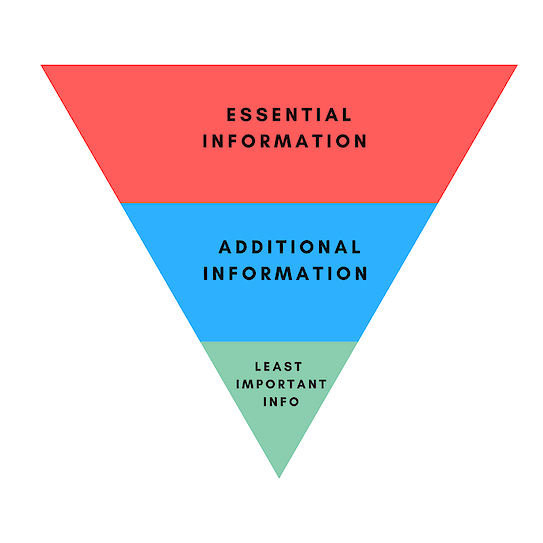Essential tips for writing for the web
Having a website is essential to most businesses. You might know you need one, but do you know what content to put on it?
In general, when it comes to looking for information online, people have a very short attention span. Figures vary, but it’s a common assumption that it takes people 7 seconds to decide whether or not to stay on your site – that’s not long to give them what they want!
Writing for the web is therefore slightly different to writing for other formats: you want your content to be easily digestible, straightforward and short.
Here are our tips for writing content for a website.
First things first
Start with the most important information: people don’t spend a lot of time looking for the information that they need, so make sure they find out what is important within the first few sentences. This is sometimes called the “inverted pyramid” technique:

Answering some simple questions such as:
- What is the site about
- What do you want people to do here
Should help you get the vital information to the top.
Short paragraphs
Keep your paragraphs clear, and short. It may seem strange to keep paragraphs to one or three sentences at most, but this is a fine length for web content.
Consider breaking up longer paragraphs with formatting – adding a block quotation, or using bold text to highlight important information.
Break it into chunks
Breaking your information down into relevant chunks will help ensure it is easy to digest:
- limit each paragraph to one idea.
- Using bulleted lists, graphics or images can also help to get the right information across easily.
Use descriptive subheadings
Your content will be much more easily digestible if you use subheadings. This also makes it easy for people to find the information they need quickly - people tend to scan a page for information, and creating subheadings means they can get the gist of the content without having to read every sentence.
Say it once
Only say what is necessary, and avoid any needless repetition.
Check Your Spelling
It’s vital that your spelling is correct if your pages are going to show up in search engines, and it’s also important not to irk potential customers with sloppy mistakes. Use a spellchecker and get someone else to proof your copy before you hit publish to help prevent any errors.
Keep it short, and simple
You might feel that you need to write a lot to fully explain your business or service, but in general, keeping the written content short and concise is much more effective.
Avoid unnecessary words, and use simple language: avoid jargon, or over complicated terms – for example choose “cheap” over “cost effective”; or “promptly” instead of “in a timely manner”.
Make sure every page makes sense
Not every visitor to your site will necessarily arrive on the home page first: be prepared that any of your site’s pages could be the first they see, and that the page should make sense on its own. They shouldn’t need to visit the home page first or navigate around the site in any particular order to understand what your site is all about.
It’s therefore important that the content on each page is relevant and straightforward.
We hope you found these tips helpful! If you’d like any advice or help with creating content for your website, please get in touch.
